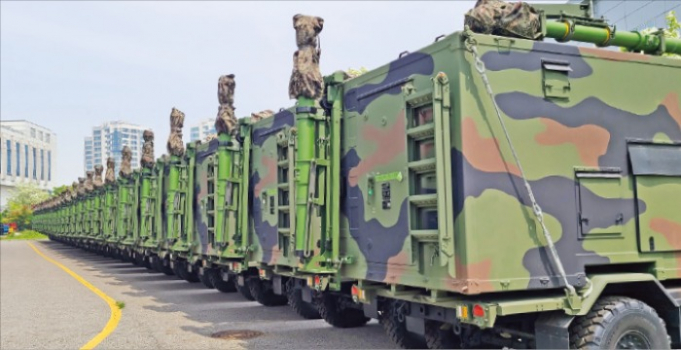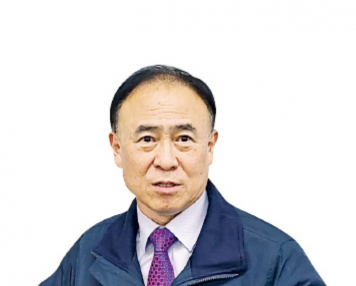Korean SMEs
Boeing-backed Huneed eyes civil aircraft market beyond jets
Huneed produces telecommunications devices and electrical control panels for aircraft
By May 23, 2023 (Gmt+09:00)
2
Min read
Most Read
LG Chem to sell water filter business to Glenwood PE for $692 million


Kyobo Life poised to buy Japan’s SBI Group-owned savings bank


KT&G eyes overseas M&A after rejecting activist fund's offer


StockX in merger talks with Naver’s online reseller Kream


Mirae Asset to be named Korea Post’s core real estate fund operator



South Korea’s Huneed Technologies specializes in aircraft components such as military communications equipment and supplies them to the armed forces and Boeing Co.
The company, managed by former one-star general officer Kim Wang-kyung, is a key developer of wireless transmission systems, which serve as a so-called telephone exchange within the Korean Army.
Now it is preparing to spread its wings to enter the civil aircraft parts market.
“We are stepping up research and development to expand our footprint in the aircraft market,” Huneed's Chief Executive Kim told The Korea Economic Daily on May 19.
“Huneed will grow as a company of telecommunications devices for use in various sectors to ensure real-time information communications and successful joint operations.”
He did not specify its business plan for private aircraft components.
Listed on the Kospi main bourse, Huneed produces traceable high-capacity trunk radio systems (HCTRS) that allow automatic identification of radio stations for long-distance communication.
Boeing, one of the world’s two largest airplane manufacturers, invested $20 million in Huneed in 2006. Since then, it remains its No. 2 shareholder with an 11% stake in the company, which has a market capitalization of 95 billion won ($72 million).
“We became a partner under an offset agreement to supply our wireless harnesses embedded in Boeing’s jet fighters,” said Kim.
Under the agreement, Huneed would be required to transfer some of its technologies or purchase airplane parts from Boeing in return for selling its products.
Huneed has been expanding its supply to Boeing into electrical control panels equipped in the H-47 helicopters and F-15EX jet fighters. Boeing expects the F-15EX to be a backbone fighter for the US Air Force over the next several decades, according to its website.

CEO Kim joined Huneed in 2022. The former brigadier general in the South Korean Army previously worked at Hanwha Munitions Corp., an arms manufacturer, for nine years.
Huneed was established in 1968 as an electronics parts maker. It then transformed into a supplier of military communications equipment and other aircraft components after it was acquired by Korea Defense Industry Association Chairman Kim Yoo-jin in 2000.
Huneed says it is now competitive enough to challenge finished product suppliers in the communications equipment market.
Last year, it posted an operating profit of 12.6 billion won on sales of 222.4 billion won, steady with its previous year’s results.
However, there is a challenge ahead for Huneed to further grow its business.
Now classified as a medium-sized company in South Korea, from 2021 it is no longer eligible for government subsidies and tax benefits granted to small enterprises.
That means Huneed may face restrictions on its shipment growth to Boeing, said CEO Kim, who is urging the government to amend the relevant regulations.
Its shares have advanced 10% year-to-date, compared to the benchmark Kospi's 15% gain over the same period.
Write to Hyung-Chang Choi at calling@hankyung.com
Yeonhee Kim edited this article.
More to Read
-
 Aerospace & DefenseS.Korea's KAI signs $105 mn deal to supply parts for Boeing aircraft
Aerospace & DefenseS.Korea's KAI signs $105 mn deal to supply parts for Boeing aircraftFeb 28, 2023 (Gmt+09:00)
1 Min read -
 Aerospace & DefenseKorean military aircraft maker KAI to spend $1.1 bn on R&D
Aerospace & DefenseKorean military aircraft maker KAI to spend $1.1 bn on R&DDec 12, 2022 (Gmt+09:00)
1 Min read -
 Mergers & AcquisitionsAircraft maker KAI: Hanwha Group's new M&A target?
Mergers & AcquisitionsAircraft maker KAI: Hanwha Group's new M&A target?Sep 27, 2022 (Gmt+09:00)
2 Min read -
 AirlinesHanwha Aerospace in $320 mn deal to supply aircraft engine parts to GE
AirlinesHanwha Aerospace in $320 mn deal to supply aircraft engine parts to GEMay 25, 2021 (Gmt+09:00)
1 Min read
Comment 0
LOG IN


